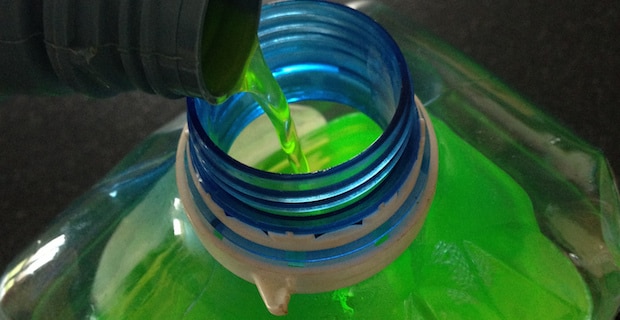
Many of the most commonly consumed foods and beverages on the market contain propylene glycol, an ingredient found in antifreeze. Propylene glycol is a form ofmineral oil and is available in several grades. The pharmaceutical grade is less concentrated than the industrial grade, the latter of which is used in the making of antifreeze as well as enamels, paints, airplane deicers, engine coolants, and varnishes. In antifreeze and deicers in particular, propylene glycol has replaced ethylene glycol, an extremely toxic substance, since the former is safer.
Pharm grade propylene glycol is used for a variety of purposes in food ranging from an anticaking agent to an antioxidant, dough strengthener, emulsifier, flavor agent, humectant (reduces moisture), processing aid, solvent, stabilizer and thickener, and texturizer. It also is an ingredient in e-cigarettes.
Read more about food preservatives to avoid
But that doesn’t mean the pharm grade gets good marks for safety even though the Food and Drug Administration (FDA) has given it GRAS (Generally Recognized as Safe) status. Although some experts argue that pharm grade propylene glycol gets a bad rap, some studies have indicated the preservative can cause health issues when used internally and externally.
Studies conducted using mammalian cells, for example have shown that use of propylene glycol can cause cell mutation, which can lead to cancer. The FDA has admitted that this food preservative and food additive can cause kidney damage when ingested in large amounts and that make contact with the skin can result in irritation.
To digress from food and beverages for a moment, it’s also important to note that propylene glycol in the air in homes and other buildings (from paints, varnishes, enamels, furniture) have been associated with allergy and asthma. The authors of a Harvard School of Public Health study suggested that propylene glycol esters in indoor air can induce or exacerbate allergic symptoms, rhinitis, eczema, and asthma in children.
In the United States, the FDA has determined that foods and beverages can contain up to five grams of propylene glycol per kilogram of body weight and be considered safe. Our European friends, however, have severely limited the amount to only 0.1 gram per kilogram. Obviously they are not as convinced of the preservative’s safety as is the US.
Foods and beverages with propylene glycol
Propylene glycol can be found in scores of common foods and beverages, and you will not always see it listed on the ingredient panel either. For example, if food manufacturers use an ingredient that contains propylene glycol and that ingredient was purchased pre-made from another source, they are not required to list propylene glycol because it is a sub-ingredient. One example is artificial butter flavor.
That said, here are some foods that typically contain propylene glycol and the reasons why:
- Baked goods, to absorb and retain moisture to help keep products moist longer
- Beer, to help maintain the foamy head
- Cake and cookie mixes, so the starch does not crystallize
- Flavored coffees, to help the flavors penetrate the coffee beans
- Frostings, so they remain thick once packaged
- Ice cream, so your dessert will be creamy and without ice crystals
- Margarine, to maintain creaminess and shape
- Salad dressings and sauces, to maintain thickness and as an emulsifier
- Snack chips, for carrying flavors
- Soda, where it serves to inhibit bacteria and carry flavors
- Whipped dairy/nondairy products, so your whipped cream will last and last and last…
Read more about the 7 worst food additives to avoid
The bottom line is, propylene glycol is a food additive/preservative that should not be on your menu. Read labels carefully, choose unprocessed, organic foods whenever possible, and you should not have to worry about propylene glycol!
Sources
Image: Sean MacEntee




